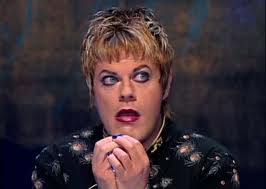I love Eddie Izzard. Do you?
In one of his absolutely best skits, dressed in his executive transvestite garb, in Dressed to Kill, Izzard says that we all know how to name and punish someone who murders one or several people. We have monikers such as a serial killer and mass murderer. However, Izzard points out that we come up blank when it comes to labelling individuals who murder over a hundred thousand people (read: Hitler, Stalin or Pol Pot…).
Murder and the penal system is a tricky and sensitive topic. Not an easy dinner table conversation, by any standard. It is not a topic that leaves one neutral. Perhaps because of the level of sensitivity, it seems that the world has no sense of balance or center of gravity in the affair.
Around the world, it is astounding to see the range of standards for dealing with criminals. There is the autocratic, unmerciful, unsupervised version in certain radical states (China, Iran, North Korea and Yemen are purportedly the top 4 in meting out the death penalty, followed unceremoniously by the US)*. As of May 2012, the death penalty is legal in 33 states in the US. Then, according to various laws, some countries will hand out sentences of “life imprisonment” – with life being some fanciful number, well below 100 years.
It seems curious when you can have, in the “developed” world, such discrepancies in sentences. Murder can be far less punishable than financial embezzlement. Here are a sampling of different cases:
- The 74-year-old Bernie Madoff was sentenced to 150 years (and $17B in forfeiture) after his titanic Ponzi scheme came apart. [USA]
- The 31-year-old Jerome Kerviel was sentenced to pay $6.7B in fines and 5 years in prison (plus 2 years suspended) for his derivatives trading errors at Société Générale, despite the fact that the gains were not his personally to realize. [France]
- A death sentence (that was successful only on the second electrocution attempt) for the apparently falsely accused 18-year-old Willie Francis (see my friend, Gilbert King’s book, The Execution of Willie Francis). [USA] Of course, there are many more such cases around the world – see Wikipedia’s entry for wrongful executions.
- An elaborate 11-year stalemate in Guantánamo for the 5 masterminds of the September 11 terrorist attacks. Only recently, the Pentagon has declared that the charges “could carry the death penalty.” [USA]
- In the UK, this week, an armed robber, Yohan Clarke, 33, was jailed for 22 years for shooting, but not killing, someone in the stomach. Source was Evening Standard [now defunct link]. [UK]
- And now, there is a pending punishment for Anders Breivik in Norway, for killing 77 people in two separate attacks: 21 years in prison with possible five-year extensions for as long as he is considered a danger to society. 21 years, really? That is, basically, 4 months per victim. Source: Telegraph [Norway]
Of course, as Izzard points out, there was house arrest for Pol Pot (aged 72), responsible for 1.7 million deaths in Cambodia, during a 3-year stint.
What is a life worth? What is life imprisonment, if it is not until the end of your life?
I am beginning to doubt that their system is any less crazy than any Western so-called civilized system? Who has it right?
It is all rather confusing, if not demoralizing, when you start to see such discrepancies in terms of punishment. You almost think there must be some form of arbitrage going on among criminal circles. Better to kill in certain countries and not get caught doing financial misdeeds in others. What are your thoughts? Please drop in your opinion!
*The list’s top 10 is rounded out by Saudi Arabia, Libya, Syria and Somalia — not very good company, eh?













In the USA, historians and sociologists have explained that the basis of building the country’s values was on accumulation and protection of wealth, at a time when the notion of human rights, and genocide were not existing. The rights of the victims are considered to be defended by traditionalists. The victim is punished several times, after the crime.
@Yendi: sounds a little like a variation on Maslow’s pyramid of priorities. Make money and then we can concern ourselves with others? Perhaps human rights are a novelty, but the concept of genocide, surely isn’t. The resistance against and/or intolerance toward genocide is perhaps stronger these days, yet, we continue to see it happening around the world.
And, unfortunately, we continue to see mass murders, spurred by a lethal cocktail of violence in cinema, easy access to guns and mental malady.
No system of punishment seems to be either fair or overtly effective. And different countries have different approaches. I was quite touched by how Norway anniversaried the Breivik massacre and, overall by the response to “open up” even more. Counter intuitive and laudable (from the outside, at least).